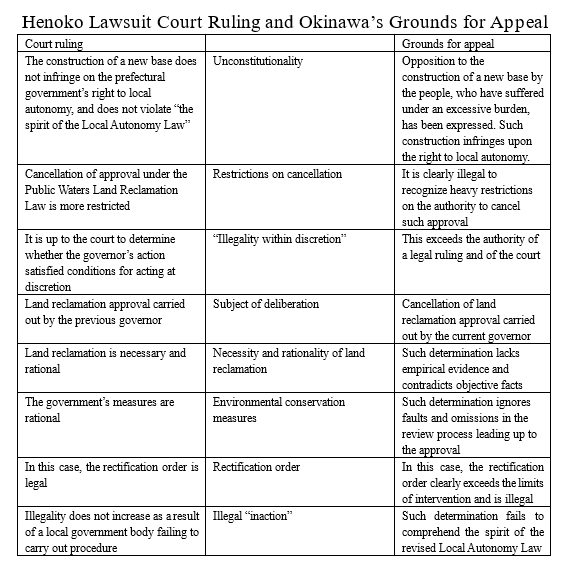Okinawa appeals ruling in Henoko lawsuit, says high court overstepped its authority
October 4, 2016 Ryukyu Shimpo
Commentary by Ryota Shimabukuro
The Okinawa prefectural government has appealed a ruling made by the Naha branch of the Fukuoka High Court that ruled Okinawa Governor Takeshi Onaga’s cancellation of approval to reclaim land in Henoko, Nago City to be “illegal”. The prefectural government has submitted its grounds for appeal to the Supreme Court.
Okinawa has once again pointed to “omissions” and “deficiencies” in the High Court’s ruling, which acknowledged each of the central government’s claims without undergoing sufficient verification of the facts.

In reviewing the High Court’s ruling, the Supreme Court’s deliberation will only cover the question of whether the ruling involved a violation of the constitution or a serious violation with respect to interpretation of judicial precedents or laws and regulations. In light of this fact, the prefectural government’s grounds for appeal includes mention of the fact that the new base construction conflicts with the Japanese constitution, and also reviews the ruling from various legal perspectives, referencing “violation of the laws of logic,” “violation of empirical laws,” and “premature decision-making” in preparation for the Supreme Court’s deliberation.
The original ruling saw the Fukuoka High Court “take the place of” the prefectural government, which is the administrative body theoretically responsible for determining the justifiability of the land reclamation approval. Upon doing so, the Fukuoka High Court drew the conclusion that the former governor’s approval of the land reclamation “did not involve a breach of discretionary authority”, thus determining the current governor’s cancellation of the approval to be illegal.
The documents submitted by the prefectural government criticize the way in which the litigation was conducted, pointing out that the court did not demonstrate specific “decision-making criteria” used in its deliberation, and that it further refused to hear testimony from expert witnesses despite being requested to do so by the prefectural government; yet it ultimately accepted at face value all of the arguments made by the central government, including those relating to specialized fields.
The conclusion of the ruling drew backlash by going so far as to assert that “in order to remove the harm caused by Futenma Air Station, there is no alternative but to construct the new facilities.” In response to the claims of the court, which ratified the central government’s claim that “Henoko is the only option,” the prefectural government argues that such claims constitute a violation with respect to the Public Waters Reclamation Law, stating, “[the ruling] overstepped the limits of a judicial ruling and the authority of the court.”
The prefectural government also argues that forcefully building, in opposition to the will of the people, a U.S. military facility in which domestic Japanese law will not apply is a violation of the constitution. From the perspectives of the rationality of the Henoko land reclamation plan, its effect on the lives of local residents and on the natural environment, and the extent to which it contributes to the public good, many believe that the High Court ruling lacked sufficient deliberation. Even some members of the central government, which welcomed the ruling in its own favor, have expressed bewilderment at the extent of judicial “overreach,” wondering why the court went so far as to make declarations that were not even necessary. The Supreme Court must now conduct a thorough investigation of the High Court’s ruling.
Previous Article:Higashi Village’s Osprey and helicopter noise complaints in June outnumber those from last year
Next Article:80 percent of Ishigaki Island’s coral reefs becoming bleached
[Similar Articles]
- Digital Edition Extra: Supreme Court dismisses Okinawa’s appeal in Henoko lawsuit
- Japan asks Supreme Court to dismiss Okinawa’s appeal against ruling made by Fukuoka High Court on Henoko lawsuit
- Futenma roar appeal dismissed by Supreme Court without issuing a flight ban
- Okinawa appeals Henoko ruling; final decision expected by year’s end
- Prefectural government’s loss in Henoko appeal imminent with December 20 decision date
 Webcam(Kokusai Street)
Webcam(Kokusai Street)


